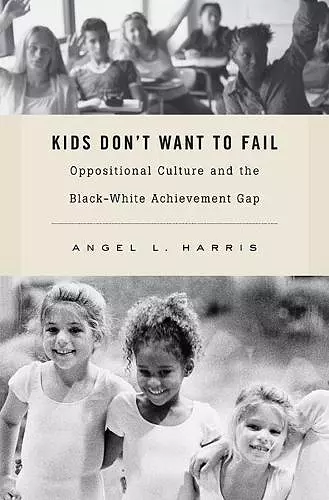Kids Don't Want to Fail
Oppositional Culture and the Black-White Achievement Gap
Format:Hardback
Publisher:Harvard University Press
Published:13th Jul '11
Should be back in stock very soon

Kids Don't Want to Fail is quite remarkable in its detail, care, and depth as a critical empirical examination of the oppositionality hypothesis: the widely held belief that black student underachievement is attributable to a cultural resistance to schooling. Harris writes so clearly and in a style free of jargon that the quantitative emphasis of his study should not prove a barrier to non-specialist readers. -- William Darity, Jr., Duke University Kids Don't Want to Fail powerfully critiques a position held by many social scientists and teachers that African American students take an oppositional approach to education. This book offers an important-indeed, an indispensable-corrective by systematically decomposing the key assumptions of this position and then masterfully showing that these assumptions cannot be substantiated with empirical evidence. -- Brian Powell, Indiana University
Kids Don’t Want to Fail uses empirical evidence to refute the widely accepted hypothesis that the black-white achievement gap in secondary schools is due to a cultural resistance to schooling in the black community. The author finds that inadequate elementary school preparation—not negative attitude—accounts for black students’ underperformance.
Understanding the causes of the racial achievement gap in American education—and then addressing it with effective programs—is one of the most urgent problems communities and educators face.
For many years, the most popular explanation for the achievement gap has been the “oppositional culture theory”: the idea that black students underperform in secondary schools because of a group culture that devalues learning and sees academic effort as “acting white.” Despite lack of evidence for this belief, classroom teachers accept it, with predictable self-fulfilling results. In a careful quantitative assessment of the oppositional culture hypothesis, Angel L. Harris tested its empirical implications systematically and broadened his analysis to include data from British schools. From every conceivable angle of examination, the oppositional culture theory fell flat.
Despite achieving less in school, black students value schooling more than their white counterparts do. Black kids perform badly in high school not because they don’t want to succeed but because they enter without the necessary skills. Harris finds that the achievement gap starts to open up in preadolescence—when cumulating socioeconomic and health disadvantages inhibit skills development and when students start to feel the impact of lowered teacher expectations.
Kids Don’t Want to Fail is must reading for teachers, academics, policy makers, and anyone interested in understanding the intersection of race and education.
Kids Don't Want to Fail is quite remarkable in its detail, care, and depth as a critical empirical examination of the oppositionality hypothesis: the widely held belief that black student underachievement is attributable to a cultural resistance to schooling. Harris writes so clearly and in a style free of jargon that the quantitative emphasis of his study should not prove a barrier to non-specialist readers. -- William Darity, Jr., Duke University
Kids Don't Want to Fail powerfully critiques a position held by many social scientists and teachers that African American students take an oppositional approach to education. This book offers an important—indeed, an indispensable—corrective by systematically decomposing the key assumptions of this position and then masterfully showing that these assumptions cannot be substantiated with empirical evidence. -- Brian Powell, Indiana University
Sociologist Harris provides an important corrective to academic theories and popular thought that attribute racial differences in educational achievement to students' attitudes toward schooling. -- G. L. Ochoa * Choice *
- Nominated for Pierre Bourdieu Award 2012
ISBN: 9780674057722
Dimensions: unknown
Weight: unknown
336 pages